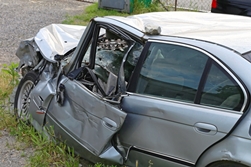
Staring at the front of a big-rig truck as it crashes into the front end of your vehicle would be on the top of the majority of people’s lists of scariest experiences. Sadly, head-on truck collisions are more common than people may think. According to the Federal Motor Carrier Safety Administration (FMCSA), head-on collisions caused the most fatal truck crashes in 2014, resulting in 57.5 percent of all fatalities and 2,152 deaths, 43,000 injury crashes, and 121,000 property damage only crashes.
Why Are Trucks Involved in So Many Head-On Collisions?
The unique characteristics of truck driving contribute to truckers causing so many head-on accidents. Some of these reasons include:
- Navigating curves. Because of the sheer size and weight of a truck, a trucker can easily veer into oncoming traffic when he has difficulty navigating a curve—a common problem when a driver is inexperienced or inattentive.
- Distracted driving. When a trucker is texting or talking on cell phone, setting his GPS, or fiddling with instrument controls, he is not paying attention to his driving. In a split second, he can swerve into a lane of unsuspecting motorists. Distractions are very tempting to truckers given the long hours they drive while staring at the road.
- Being fatigued. Truckers can drive for 10 hours without a break, and many drive even more hours than this without a break in violation of federal regulations. It is not surprising that trucks veer out of their lane when they become fatigued or even worse, fall asleep while driving.
- Speeding. Truck companies often pressure truckers to deliver their loads on unrealistic schedules. When truckers speed or do not slow down enough for the weather conditions such as rain, fog, and ice, it can result in them causing head-on collisions.
- Impaired driving. When a trucker is intoxicated either by alcohol or drug use, his reaction times and general driving skills are reduced. Any of these reasons can cause a truck driver to drift into oncoming traffic.
- Swerving suddenly. If a truck driver is not alert, he may not see a hazard on the road ahead and may have to swerve suddenly—right into the front end of another vehicle.
- Improper maintenance. Federal regulations require truckers to inspect their trucks and have any defects and maintenance issues repaired before heading on their way. Trucking companies and truckers routinely ignore these requirements and it may lead to a head-on collision while traveling on the road.
- Brake failure. Sadly, brake failure is not only caused by lack of maintenance, which is bad in itself. Some trucking companies have brakes unhooked or depowered to save on wear and tear, sacrificing innocent victims’ lives.
Devastating Injuries Caused by Head-On Collisions
Victims of head-on collisions can suffer even more horrific injuries if the vehicle becomes entangled with the truck in an override or underride accident or the force of the crash causes a multi-vehicle crash. Common injuries victims can suffer include:
- Broken bones
- Traumatic brain injuries, concussions, and other head injuries
- Facial damage, including to the eye socket, cheek, and chin
- Dental injuries
- Internal organ damage
- Neck injuries
- Spinal injuries—sometimes leading to partial or complete paralysis
- Airbag injuries
- Decapitation—rare but possible
- Death
Special Liability Issues When Brake Failure Causes a Head-On Crash
If brake failure caused a head-on collision, accident victims may have a products liability claim as well as a claim against the trucker and trucking company for negligence. Additional parties who may face liability include:
- The company responsible for truck maintenance or repair
- The brake manufacturer
- The truck manufacturer
- The owner of the truck—often the trucking company
Were you hurt in a head-on truck accident? Brauns Law Accident Injury Lawyers, PC may be able to help you get the compensation you deserve and take the stress of fighting with the insurance company off your shoulders. Fill out our contact form to schedule a free consultation to learn more about your legal options.
Related Links:














